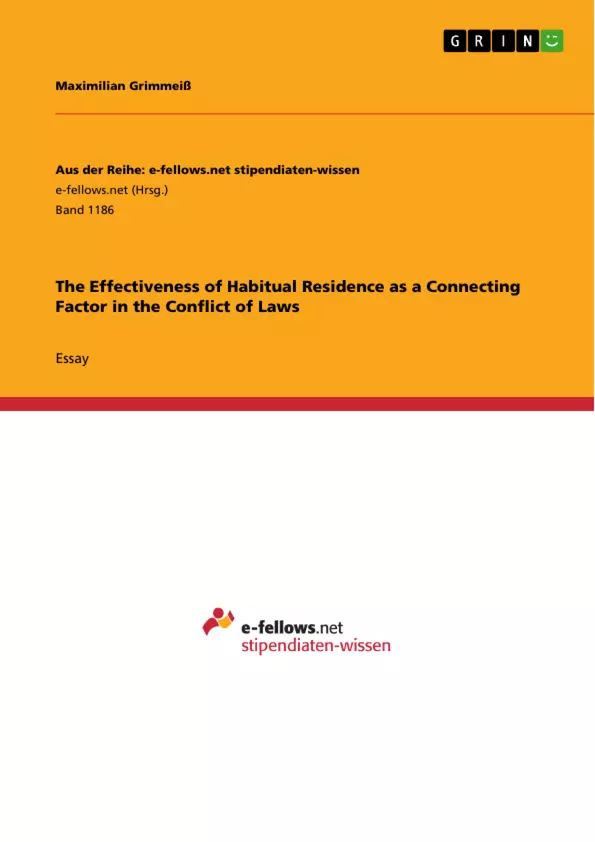Habitual residence as a connecting factor enjoys popularity in the Hague Conventions and Rome regulations. Insofar it has to be considered a successful concept that took hold in the realm of private international law, but being successful in the sense of being used in different regimes and various legal instruments does not equal being effective.
In this essay the arguments of the changeability of the concept as a reflection of the modern world will be looked at alongside the ordinary meaning approach. Further there will be consideration on the possibility of one being without a habitual residence, the accusation of habitual residence being an underdeveloped concept and questions on the uniformity within the common market.
Inhaltsverzeichnis (Table of Contents)
- I. Effectiveness of law.
- II. Changeability, reflection of the modern world and application.
- III. Ordinary meaning approach.
- IV. Without a habitual residence.
- V. Underdeveloped concept.
- VI. Uniformity to support the internal market.
- VII. Conclusion.
Zielsetzung und Themenschwerpunkte (Objectives and Key Themes)
This article evaluates the effectiveness of habitual residence as a connecting factor in the conflict of laws. It explores the concept's application in various legal regimes and its capacity to reflect modern, globalized society. The article examines the predictability of its results and the extent to which it governs different scenarios. It also assesses the concept's ability to provide a unified approach to international legal issues.
- Effectiveness of habitual residence as a connecting factor in the conflict of laws.
- Changeability of habitual residence and its reflection of the modern world.
- Ordinary meaning approach to habitual residence.
- The problem of individuals lacking a habitual residence.
- The role of habitual residence in supporting the internal market of the European Union.
Zusammenfassung der Kapitel (Chapter Summaries)
- Chapter I: Discusses the concept of effectiveness in the context of law and outlines a specific approach to assessing the effectiveness of habitual residence. It argues that the effectiveness of the concept is determined by its ability to govern a wide range of scenarios, its predictability, and the breadth of its application.
- Chapter II: Analyzes the ability of habitual residence to adapt to the modern world and the changing living arrangements of individuals. It compares habitual residence to domicile and highlights its advantages in reflecting contemporary mobility.
- Chapter III: Explores the ordinary meaning approach to habitual residence, which seeks to avoid technical rules and rely on common understanding. It discusses the challenges and advantages of relying on ordinary meaning and acknowledges the role of case law in interpreting the concept.
- Chapter IV: Addresses the issue of individuals lacking a habitual residence, analyzing the scenarios in which this problem arises. It examines the arguments against and in favor of the concept's effectiveness in such situations.
- Chapter V: Addresses concerns regarding the underdeveloped nature of the concept of habitual residence, analyzing the progress made in developing the legal concept and the extent to which the concerns are still relevant.
- Chapter VI: Evaluates the effectiveness of habitual residence within the context of the European Union's internal market. It discusses the concept's role in unifying legal interpretations and supporting the free movement of persons, goods, and services.
Schlüsselwörter (Keywords)
This article focuses on the concept of habitual residence, its effectiveness as a connecting factor in the conflict of laws, its applicability to modern society, and its role in supporting the European Union's internal market. Key terms include connecting factors, conflict of laws, domicile, ordinary meaning, case law, globalized society, internal market, and free movement.
What is "habitual residence" in private international law?
Habitual residence is a connecting factor used to determine which country's laws apply to an individual, focusing on where a person actually lives rather than their legal domicile.
Is habitual residence more effective than domicile?
The essay explores this by looking at how habitual residence better reflects the modern, mobile world, though it notes that being widely used doesn't always mean it is perfectly effective.
What is the "ordinary meaning approach"?
It is an approach that avoids technical legal definitions, relying instead on common understanding and factual circumstances to determine where a person is habitually resident.
Can a person be without a habitual residence?
Yes, the essay discusses the possibility of individuals (such as nomads or frequent travelers) being without a clear habitual residence and the legal challenges this creates.
How does habitual residence support the EU internal market?
By providing a uniform connecting factor, it supports the free movement of persons and goods by making international legal outcomes more predictable within the common market.



